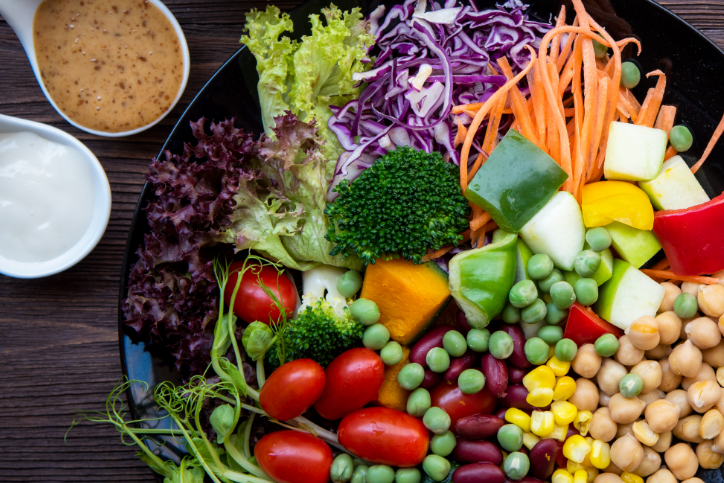
Vegan and plant-based diets have been increasing in popularity amongst even the top athletes over the past decade. Venus and Serena Williams, Lewis Hamilton, Arnold Schwarzenegger, Chris Paul, Tom Brady, and Cam Newton are just a few examples of athletes who are completely vegan or who eat primarily plant-based diets. In addition, many people, including these top athletes, decide to go vegan or plant-based for personal health reasons and to reap the many benefits of these diets.
Tennis athlete Venus Williams decided to go vegan in 2011 after being diagnosed with Sjögren’s syndrome. This is a debilitating autoimmune disease that carries with it symptoms like joint pain, swelling, fatigue, and digestive issues. Cam Newton credited his change to a vegan diet to his quick recovery after a foot sprain. In an interview with ESPN, he is quoted as saying, “Vegan. Vegan strong. That helps a lot. I’ve been a vegan all year, and I don’t think I’m going back. I feel good. I recover well. And that’s pretty much what it’s all about.” Arnold Schwarzenegger has been following a mostly plant-based diet for over five years for environmental reasons and has credited his dietary change to lowering his cholesterol.
We were interested in delving more into some pros and cons of vegan and plant-based diets, especially regarding fitness goals and athletic performance. After reviewing several sources, we found that vegan and plant-based diets have been found to help athletic performance by improving cardiovascular health, reducing body fat, reducing plaque and hardening of arteries (atherosclerosis), and reducing inflammation. In addition, plant-based and vegan diets can also improve athletic recovery since these diets contribute to increased blood flow in the body, leaner body composition, antioxidant capacity in the body, reduced inflammation, and glycogen storage.
One area of concern for those on plant-based or vegan diets may be that there is not enough vitamin B12 to meet daily requirements since this vitamin is found in more significant amounts in animal sources. Getting enough B12 in the diet is crucial for overall health and fitness performance. However, there are a few favorite vegan sources of this crucial vitamin, such as nutritional yeast, which is often used in savory dishes and has a somewhat “cheesy” taste. Also, cereal is sometimes fortified with vitamin B12. Suppose you want a deliciously refreshing and highly functional way to boost your vitamin B12 levels throughout the day. In that case, TAPOUT Performance Hydration and Recovery Drinks also give you 2892% of your daily recommended vitamin B12, leaving you with no doubt you are getting enough B12 to power your healthy lifestyle! 2892% of your daily value may seem like a lot, but don’t forget that vitamin B12 is water-soluble, which means you need to replenish your vitamin B12 stores in your body throughout the day.
Everyone who decides to follow a vegan or plant-based diet will likely hear this question eventually. This question may be especially top of mind for anyone involved in strength training who has muscle-building goals. Several studies have found no significant differences between study groups following vegan diets and those following omnivorous diets regarding strength training and muscle-building. The important question is, how much protein do you need daily? The average 165-pound person needs around 60 grams of protein per day. If you are an endurance athlete or trying to gain muscle, you may need to consume 0.70-1 gram of protein per pound of body weight. Another concern regarding vegan and plant-based diets is that the meals might not contain complete proteins with all essential amino acids. Vegan or plant-based meals can often include a complete set of essential amino acids by combining several plant-based sources with complementary essential amino acids. Below are some lean and healthy plant-based protein options that can provide enough protein to meet your fitness goals if you are interested in going vegan or plant-based.
- Seitan (about 25 grams of protein preserving, avoid if you have gluten allergies)
- Tofu (about 9 grams of protein per serving)
- Plant-based protein powder (about 25 grams of protein per serving)
- Lentils (18 grams for a 1-cup serving)
- Beans (16 grams of protein for a 1-cup serving)
- Quinoa (12 grams of protein for ½ cup serving)
- Nutritional Yeast (5 grams of protein per 1 ½ tablespoons)
- Chia Seeds (6 grams of protein per 2 tablespoons)
- Nuts and Nut Butters (6-9 grams of protein per serving)
Sources:
Barnard, N. D., Goldman, D. M., Loomis, J. F., Kahleova, H., Levin, S. M., Neabore, S., & Batts, T. C. (2019, January 10). Plant-based diets for cardiovascular safety and performance in Endurance Sports. Nutrients. Retrieved December 7, 2022, from https://www.ncbi.nlm.nih.gov/pmc/articles/PMC6356661/#:~:text=Plant%2Dbased%20diets%20play%20a,been%20shown%20to%20reverse%20atherosclerosis
Kristi Wempen, R. D. N. (2022, April 29). Are you getting too much protein? Mayo Clinic Health System. Retrieved December 7, 2022, from https://www.mayoclinichealthsystem.org/hometown-health/speaking-of-health/are-you-getting-too-much-protein
Pohl, A., Schünemann, F., Bersiner, K., & Gehlert, S. (2021, October 29). The impact of vegan and vegetarian diets on physical performance and molecular signaling in skeletal muscle. Nutrients. Retrieved December 7, 2022, from https://www.ncbi.nlm.nih.gov/pmc/articles/PMC8623732/
TAPOUT Performance Hydration and Recovery Drinks have been designed to activate your body's natural energy reserves, improve performance during competition and training and promote quick and healthy recovery after exercise.
TAPOUT comes in four flavors:
- Citrus
- Cherry Lemonade
- Orange
- Peach Mango
Our Citrus flavor has 120 calories to replenish natural energy and give you a boost under difficult training conditions. It also has 240mg of natural sodium, and a blend of electrolytes and vitamins. As you work out, these vitamins and electrolytes are used by your body or lost in sweat. That's why each TAPOUT contains:
- Vitamins A, C, E
- The Vitamin B Complex
- Potassium
- Calcium
- Magnesium
- Chloride
If you're looking for a sports performance drink that replenishes these electrolytes and vitamins but prefer a no-sugar drink, TAPOUT Orange and Cherry Lemonade contain the same scientifically derived formula with zero sugar and only five calories.
No matter which flavor you choose, you can be assured that you're getting great taste from a sports drink made with no artificial colors, flavors or ingredients.
